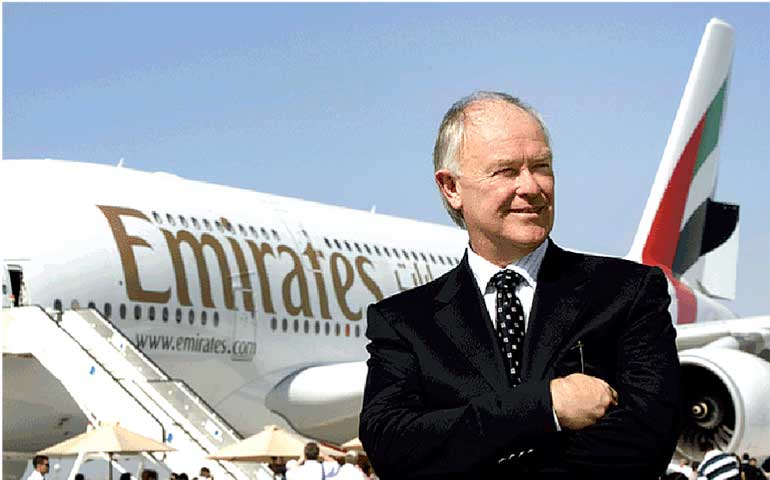Monday Feb 23, 2026
Monday Feb 23, 2026
Monday, 13 March 2017 00:02 - - {{hitsCtrl.values.hits}}

Emirates President Tim Clark
BERLIN (Reuters): Emirates, the world’s largest long-haul airline, is stripping out costs from its business as it adapts to weaker markets and a stronger dollar and the rise of low-cost long-haul rivals, the carrier’s president said on Thursday.
Changing economic conditions are forcing state-backed Gulf airlines, who have moved into many foreign markets from Asia to South America in recent years, to revise their business models and slow their once rampant growth in capacity.
“We are subject to market changes like everybody else is,” President Tim Clark told journalists in Berlin on the sidelines of the ITB travel fair.
One of the changes is the rise of lower-cost long-haul travel, he said, describing it as a “gathering storm”.
Norwegian Air Shuttle is putting pressure on established transatlantic carriers with its expansion using longer-range single-aisle aircraft to fly between smaller, cheaper local airports, while flag carriers like Lufthansa , Air France and British Airways-owned IAG are all working on low-cost long-haul projects.
“The way people travel, their decisions for travelling, the amount of money they’re prepared to pay, new entrants coming to market, long-range single aisles, it’s all changing,” Clark said.
More carriers are looking at using new, more efficient longer-range single-aisle planes for routes where they can be cheaper to operate while being easier to fill than widebody planes, whereas Emirates has an exclusively wide-body fleet.
Clark, who has been with Emirates since 1985, said he couldn’t see that changing, but added: “Maybe others coming behind me will take a different view.”
He declined to provide details or say when any new strategy would be announced but said job cuts were “not in our nature.” “It’s not a revolution, it’s an adjustment,” he added.
Emirates said in January a thousand staff had left the company in the previous three months “largely through natural attrition.”
“We are attending to the business in terms of examining, streamlining and stripping out costs,” Clark said, adding that Emirates is one of the “lowest cost operators in the international market.”

A potential order for Boeing 787 or Airbus A350 jets that Emirates has long been debating, is part of the ongoing reassessment, he said.
A decision on whether to introduce a premium economy class had also not yet been taken. “I can’t at this moment say premium economy is the right way to go,” he said, adding that Emirates wanted to be sure it wouldn’t lose business class passengers to premium economy. That seemed to contradict comments he made in December that premium economy would be rolled out “within the next year to 18 months.”
The Dubai-based carrier has previously said it’s looking for ways to boost ancillary revenue including introducing fees to pre-select economy seats and allowing passengers to buy entry to its lounges.
Meanwhile, he said that Emirates did not want to speed up deliveries of its final 25 Airbus A380s, due from 2021, because it doesn’t have the space to deploy them at Dubai airport.
Emirates saw profits drop 75% in the first half of its current financial year and Clark said the year had been “tough.” Yield decline remains an issue, but the decline has not worsened, he said.
BERLIN (Reuters): Emirates, the world’s largest long-haul carrier, said on Thursday it was concerned President Donald Trump’s latest travel order will still deter Muslim visitors to America, after booking rates on U.S. flights fell 35% following January’s ban.
Trump signed a new executive order on Monday, which takes effect on March 16, keeping a 90-day ban on travel to the U.S. by citizens of Iran, Libya, Syria, Somalia, Sudan and Yemen.
However, the order applies only to new visa applicants, meaning about 60,000 people whose visas were revoked by the previous order will now be permitted to enter. It also removed Iraq from the list.
“I am concerned. It’s the tone of it. We have brought millions of Muslims to the United States, but now they may not feel welcome, they may look at going on holiday elsewhere,” President Tim Clark told journalists in Berlin on the sidelines of the ITB travel fair.
Akbar Al Baker, the chief executive of Gulf rival Qatar Airways, said on Wednesday his airline had not seen a drop in demand for U.S. flights.
“I make sure that when I deploy my planes, they are full, that the passengers are allowed to go into and out of a country,” he said.
Demand for travel to the United States over the coming months has flattened with flights to and from the Middle East the hardest hit, a study released by travel analysis company ForwardKeys showed on Monday. The January order caused chaos and confusion at airports worldwide, with the airline industry complaining about a lack of clear and direct communication from U.S. officials.
Emirates, which flies to 11 U.S. cities, has not fully recovered from the original Jan. 27 travel ban, suspended on Feb. 3. “The effect it had was instantaneous,” Clark said.
He said the revised order issued this week offered more clarity, and there had been some positive movement in bookings on the Emirates network but not a full recovery.
“When will it recapture the original booking curve is anyone’s guess,” he said, adding that he hoped for an improvement in the summer after the usually quiet period during the Muslim fasting month of Ramadan.